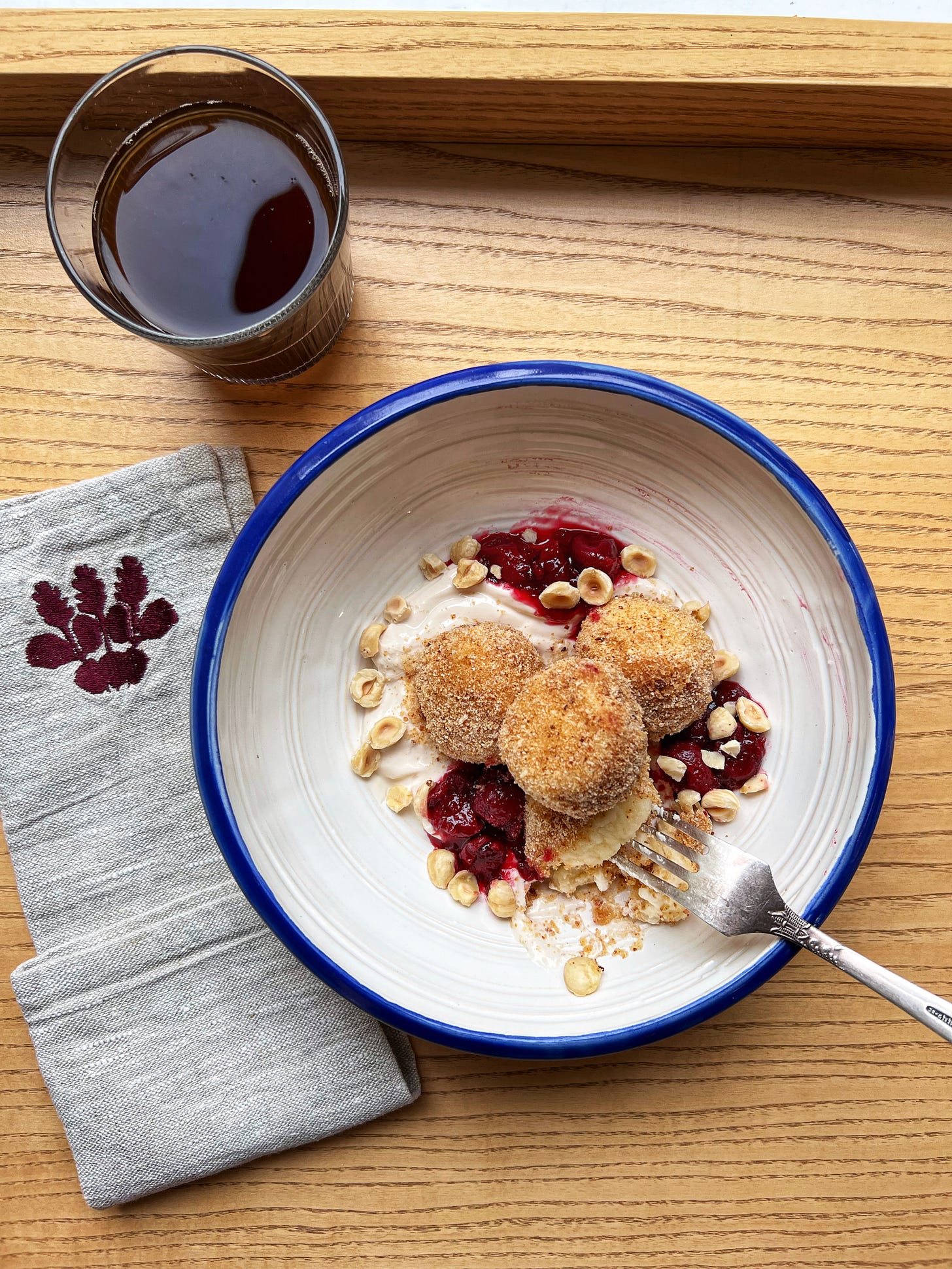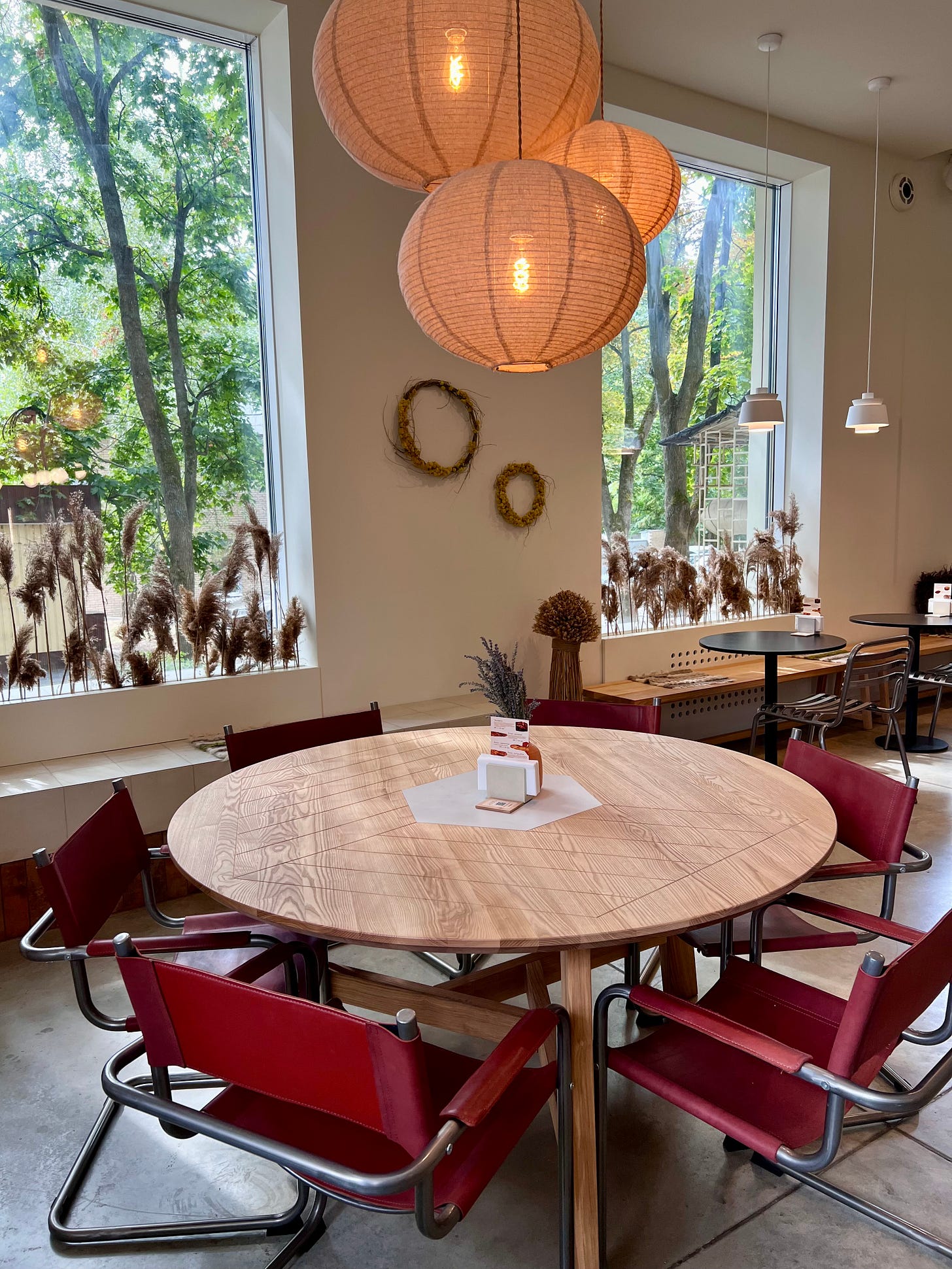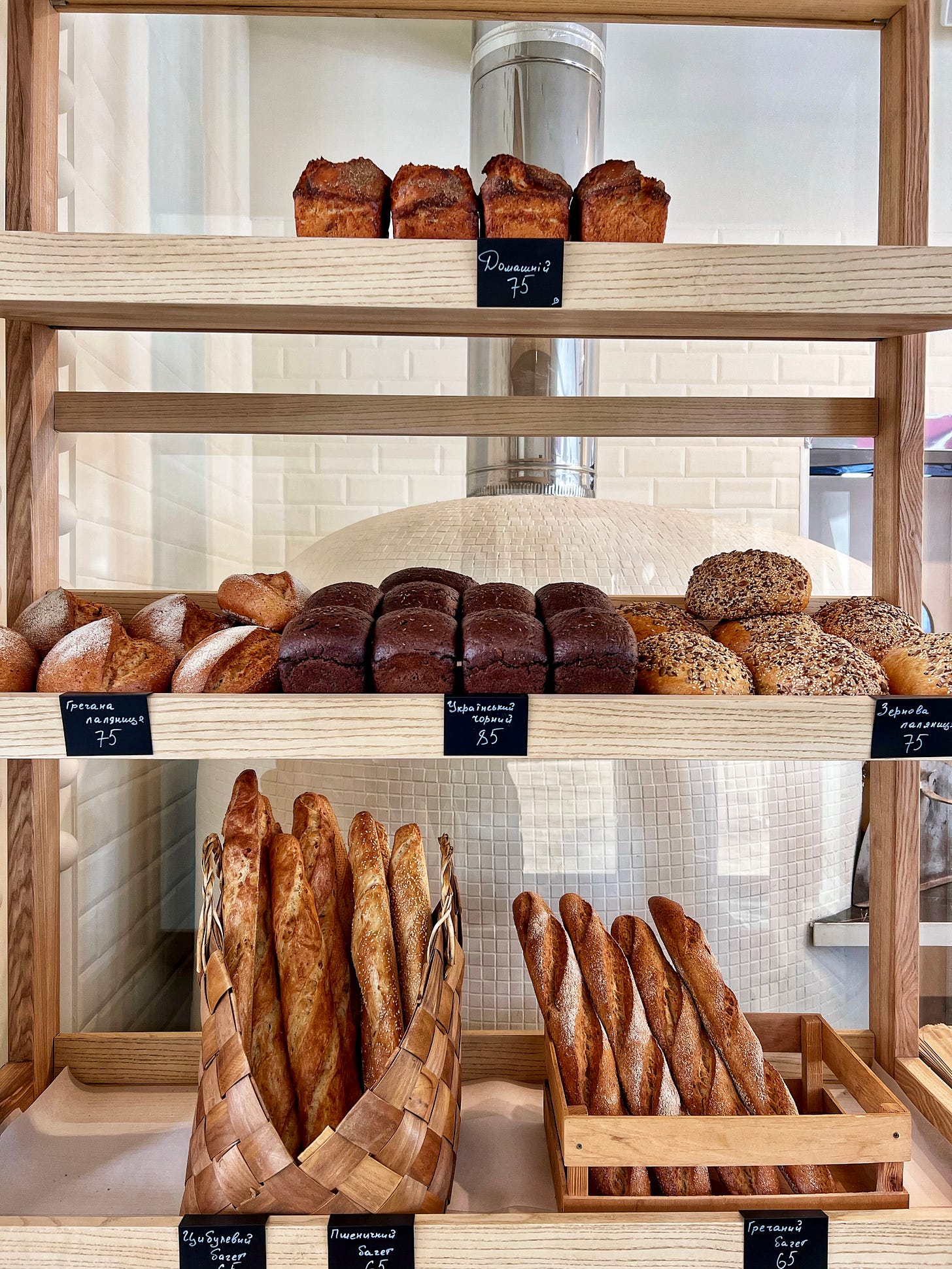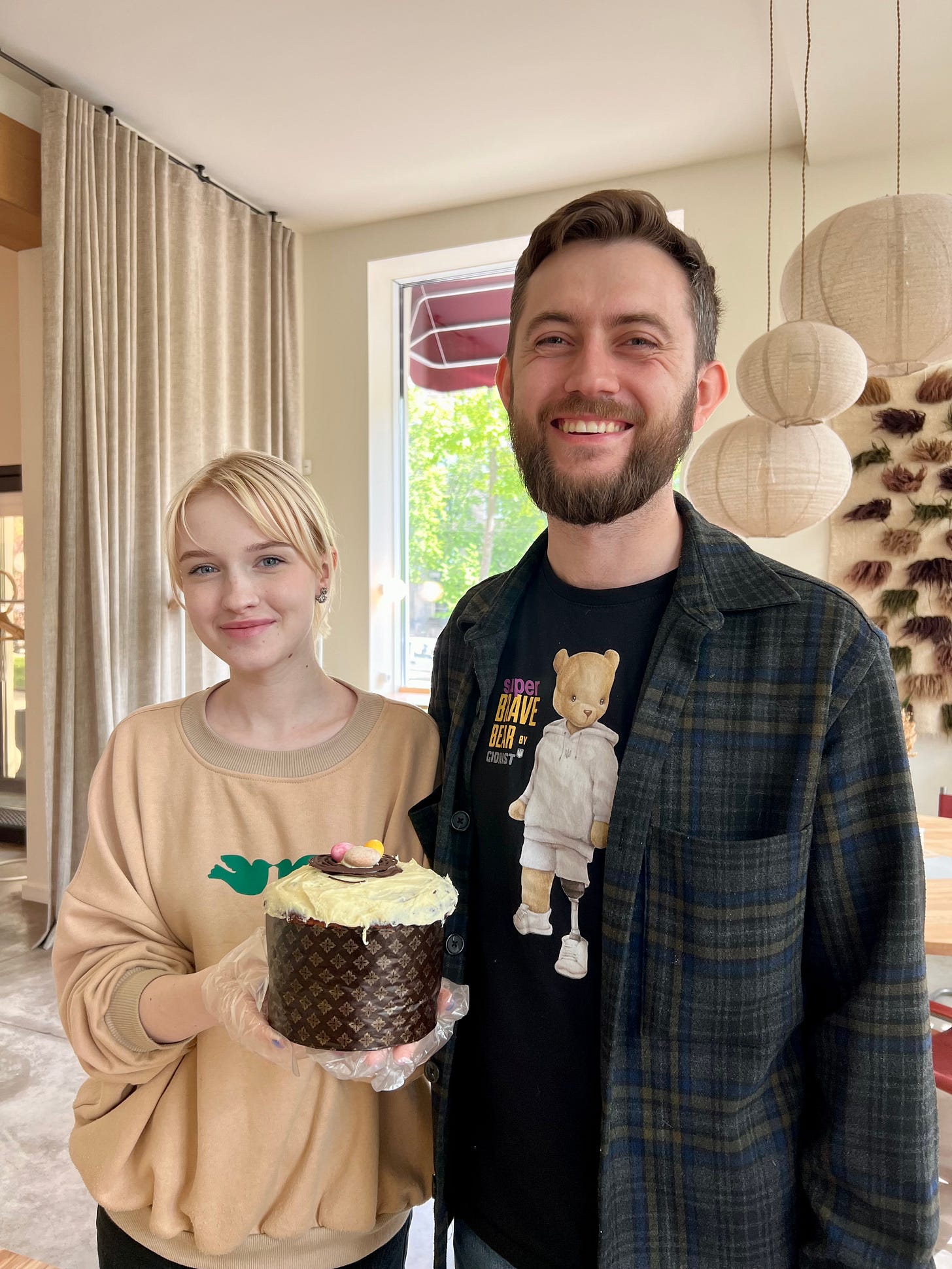Breakfast, anytime
I love Snidanishna in Kharkiv so much, I made an 800 mile round trip by train to meet a friend there for lunch. And here's why.
I first went to visit Snidanishna, a bright and airy space set back slightly from the main road near Kharkiv’s botanical gardens, when it was still a building site. Kharkiv entrepreneur Boris Lomako met us inside, his hands expansive as he sketched out his vision for the site. His previous restaurant opening, inside the city’s five star Palace hotel, had been destroyed a few weeks after it opened when a Russian missile slammed into the building, injuring dozens of people and taking out several floors. Boris shrugged slightly when I asked how he found the energy to forge ahead with another new business so soon afterwards: it’s our reality, he said. We have faith in our city and it is our motherland.
His enthusiasm for the Snidanishna project was infectious: the name means ‘breakfast-ish’ and the menu would centre around a range of modern Ukrainian dishes, which would be served at breakfast time and throughout the day. There was a wood fired oven for bread, a bakery fashioned out of what had once been a manager’s office. In the kitchen area, his chefs were running through some ideas for the menu: banosh cornmeal porridge with wild mushrooms and brinza cheese, curd dumplings from Karpatia called gombovtsi, stuffed with sour cherries, in a cherry compote with a custard like cream. Boris had plans to include space for a small shop selling a few Ukrainian products, carefully sourced from the local area. The staff had taken a trip to a town in Poltava region called Opishne, famous for its ceramics to choose bowls and plates for the cafe, and had collected a small selection of items that they could sell. A young Kharkiv couple, Misha and Daria Lazarev, who would be managing the place, were excited about the prospect of showcasing a modern interpretation of Ukrainian produce and design. Daria picked up a brown ceramic jug from one of the tables: “This is the one my grandmother had at home. We want people to see it here and think ‘oh, it is beautiful!’.
Boris Lomako on site
A few weeks later, when the building work had been finished, I went back to Kharkiv for the opening week. I arrived on a Monday morning and got the metro straight to Snidanishna, only to discover that it had been so popular over the weekend that the kitchen had completely run out of food, although they managed to rustle up a plate of bread - thick slices of dark rye, baked in the wood oven, with butter muddled with fresh herbs. I immediately bought the last loaf to take home.. The following day I went back again, and finally got the chance to try their gombovtsi dumplings. It was one of the most delicious breakfasts I have ever tried: soft, creamy balls of curd cheese, with a cherry stuffed inside, rolled in buttery breadcrumbs, and I spooned up every last drop of the thick cream and the sweet sharp sour cherry compote.
Daria appeared, just as I was finishing, pointing out all the different cakes in the glass cabinet on the counter. “We have this Lviv cheesecake, some Kyiv cake, this one is from Uzhhorod, and this is Ivano Frankivsk: we want to create dishes from all parts of our country.” She waved at a panel on one wall, covered with tufts of wool. “This board is like our meditation, you feel calm when you touch it. The wool comes from sheep in the Carpathian mountains.” The design is a deliberate statement, after all those decades of Soviet rule when Ukrainians were treated as second class citizens. “Our design was seen as ugly. But now we will make people feel proud to be Ukrainian because they have such beautiful examples of our national, traditional culture, which connects us with our history.” Snidanishna has already been nominated for an international restaurant design award, an incredible achievement given the huge challenges of operating in wartime Kharkiv.
Such beautiful design
I went back a second time for a bowl of banosh, with mushrooms and soft, salty cheese, and a fragrant loaf of buckwheat bread to take home. A week later, I took an 800 mile round trip on overnight trains from Odesa to Kharkiv and back, to meet my artist friend Olia Fedorova at Snidanishna for lunch. We sat chatting over bowls of gombovtsi and glasses of uzvar, a drink made from dried fruit which was slightly smoky and not too sweet, and I thought it had been totally worth the journey to be there, even when Russian KAB bombs flew to the city centre in the afternoon and I spent the last two hours before the train sitting in a subway station. On the way to the train, crossing the square in front of the main railway station, there was a man playing a trumpet in exuberant fashion, the melody soaring into the sky, Russian bombs be damned.
The amazing bread selection
On the way back from a volunteer trip to Donetsk region, we were approaching Kharkiv around lunchtime, and I asked tentatively if it might be possible to take a slight detour so that I could stop off at my favourite cafe. I ran inside, give Misha a hug, and he insisted on giving me a beautiful loaf of Easter paska bread, with cranberries and white chocolate. I just about had time for a slice of toasted poppyseed bread covered in hazelnut cream, for who could blame me. Running a business like this - just 25 miles from the Russian border - takes a special kind of energy. There are the constant challenges which everyone running a food business faces, compounded by the rolling blackouts, after Russia destroyed the power plants supplying Kharkiv’s electricity. Snidansihna managed to hire a large generator to keep the kitchen working, even though the rent and the fuel costs became an added expense. They have managed to keep holding regular weekend markets, and occasional collaborations, including one with my favourite Odesa restaurant Dizyngoff, putting their trademark ‘tulka’ salted fish on a special menu, along with the Odesan Jewish chopped herring dish called Forshmak.
Misha and one of his co-workers with the Paska
In late summer, when I was able to get back to Ukraine again, I went to Snidanishna three days running. I had seen a newish breakfast dish on their instagram, thin pancakes rolled around a soft curd cheese filling, with toasted walnuts and berries. It was delicious, and so was the uzvar, and it was a treat to see Misha again. I went the next day for gombovtsi, and then the following day to catch up with Boris Lomako, over coffee and a plate of the toasted poppyseed bread. He had already opened a new bakery in Kharkiv and was full of plans for the future: showing me some sketches of an exciting new project he was planning just outside the city, which he was aiming to open early next year. There is nowhere quite like Kharkiv: this iron city which lives and work through the very worst of times - and there is definitely nowhere quite like my beloved Snidanishna.








Thank you so much for sharing this beautiful story of Ukrainian resilience and love for their country and culture! The description of the food made me so hungry! Kharkiv is such a special place ❤️❤️🩹
Best restaurant in Kharkiv ❤️